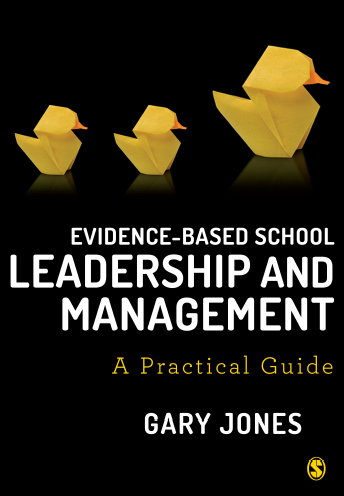The first ResearchED event I attended was in September 2014 and the London national conference. Without doubt, this was some of the most inspiring and influential professional development I had experienced in the thirty years I had been involved in education. It was inspiring because I was taking part in an event with over 1000 teachers who had given up a Saturday morning to speak and listen about something they cared about i.e. improving teaching and learning though the appropriate use of research evidence. It was influential, in that it got me thinking, reading and writing about evidence-based school leadership and management.
ResearchED London 2014 got me thinking about evidence-based school leadership and management for two reasons. First, the vast majority of the sessions at the event had a focus on teaching and learning and little attention seemed being paid to the role of research and other sources of evidence in the decision-making of senior leaders in schools. Second, that summer I had by chance read an article by Adrian Furnham ]which introduced me to the discipline of evidence-based management and I was intrigued as to whether there was a possible synthesis with evidence-based education. This contributed to me writing a book – Evidence-based School Leadership and Management: A practical guide– and 220 blogposts (www.garyrjones.com/blog).
Having now written around 300,000 words on all things evidence-based, I would like to make the following observations about the current state of evidence-based practice within schools. First, the ‘evidence-based movement’ is not going away anytime soon. We have 22 schools in the Research Schools Network; an increasing number of schools appointing schools research leads; hundreds if not thousands of educational bloggers contributing to discussions about how to improve education; social media and eduTwitter providing a forum for the articulation of views; over 20 researchED conferences scheduled for 2019; the Education Endowment Foundation (EEF) spending in 2017-18 over £4m to fund the delivery of 17 projects, involving 3620 schools and other educational settings reaching approximately 310,00 children and young people; and finally, we have Ofsted using research evidence to inform their inspection framework.
Nevertheless, despite all this time, effort and commitment being put into research and evidence-based practice, there is still much to be done to ensure evidence-based practice contributes to improved outcomes for pupils. First, we need to have an honest conversation about teacher research literacy and their subsequent abilities to make research informed changes in their practice. Research undertaken by the National Foundation for Educational and the EEF suggests that teachers have a weak variable knowledge of the evidence-based relating to teaching and learning and have a particularly weak understanding of research requiring scientific or specialist knowledge, Nelson et al (2017). Second, there is a distinction between the rhetoric and the reality of evidence-based practice within schools. Research undertaken for the Department for Education – Coldwell et al (2017) identified a number of schools where headteachers and senior leaders ‘talked a good game’ about evidence-informed teaching within their schools, whereas the reality was that research and evidence was not embedded within the day to day practice of the school. Third, it’s important to be aware there is a major debate taking place amongst educational researchers about randomised controlled trials, effect sizes, meta-analysis. Indeed as Professor Rob Coe states: Ultimately, the best evidence we currently have may well be wrong; it is certainly likely to change. (Coe, 2018)
And finally, if I was to offer any advice to teachers, school leaders and governors/trustees who are interested in evidence-based practice, it would be the following. Becoming an evidence-based practitioner is hard-work. It doesn’t happen by just reading the latest EEF guidance document, John Hattie’s Visible Learning or by spending one Saturday morning a year at a researchED conference. It requires a career long moral commitment to challenging both your own and others practice, critically examining ‘what works’ to ensure whatever actions you take bring about improvements in pupil outcomes.
Recommendations for further reading
Brown, C. (2015). Leading the Use of Research & Evidence in Schools. London. IOE Press
Barends, E. and Rosseau, D. (2018). Evidence-Based Management: How to Use Evidence to Make Better Organizational Decisions. London. Kogan-Page.
Cain, T. (2019). Becoming a Research-Informed School: Why? What? How?London. Routledge.
Coe, R. (2018) What should we do about meta-analysis and effect size CEM Blog https://www.cem.org/blog/what-should-we-do-about-meta-analysis-and-effect-size/
Coldwell, M., Greany, T., Higgins, S., Brown, C., Maxwell, B., B, S., Stoll, L., Willis, B. and Burns, H. (2017). Evidence-Informed Teaching: An Evaluation of Progress in England Research Report. London. Department for Education
Furnham, A. (2014). On Your Head: A Magic Bullet for Motivating Staff. The Sunday Times. Sunday 13 July 2014. London
Jones, G. (2018). Evidence-Based School Leadership and Management: A Practical Guide. London. Sage Publishing.
Kvernbekk, T. (2016). Evidence-Based Practice in Education: Functions of Evidence and Causal Presuppositions. London. Routledge.
Nelson, J., Mehta, P., Sharples, J. and Davey, C. (2017). Measuring Teachers’ Research Engagement: Findings from a Pilot Study: Report and Executive Summary. London. Education Endowment Foundation/NFER
This blogpost first appeared as an article in issue 4 of the researchED Magazine, which was published in June 2019
